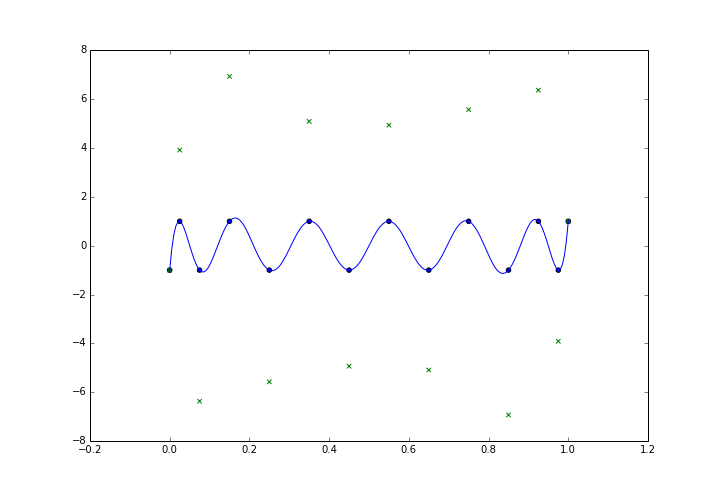Say I have a spline space $\mathcal S$ of dimension $n$ with a set of unisolvent points $(\xi_i)_{i=1}^n$, i.e., points at which I can unambiguously interpolate within the spline space. So, given values $(f_i)$, I can construct a unique spline $f \in \mathcal S$ such that $$ f(\xi_i) = f_i \quad \forall i=1,\ldots,N. $$ It is known that overshoot is possible in spline interpolation, i.e., we can have $$ \| f \|_\infty > \max_i |f_i|. $$ Can we bound this overshoot? To be more precise, given that we are free to choose the nodes $(\xi_i)$ "well", is it possible to find a good constant $C \ge 1$ such that $$ \| f \|_\infty \le C \max_i |f_i|? $$
This seems like an interesting and important question, but I haven't been able to find anything in the literature on it. It seems to be possible to bound $$ \| f \|_\infty \le \kappa \max_i |f_i|, $$ where $\kappa$ is the condition number of the B-spline basis, but this seems to be far from sharp, as the figure below indicates:

Here, the blue dots are the interpolation values $(f_i)$ and are all $\pm1$. The green x'es are the coefficients $(c_i)$ of the interpolating B-spline curve; they satisfy $\max_i|c_i| \le \kappa \max_i|f_i|$, and in this particular example, we actually have $\max_i|c_i| = \kappa\approx 7$. However, the actual overshoot of the blue spline curve is much smaller than $\kappa$ and seems to be close to $1$.
